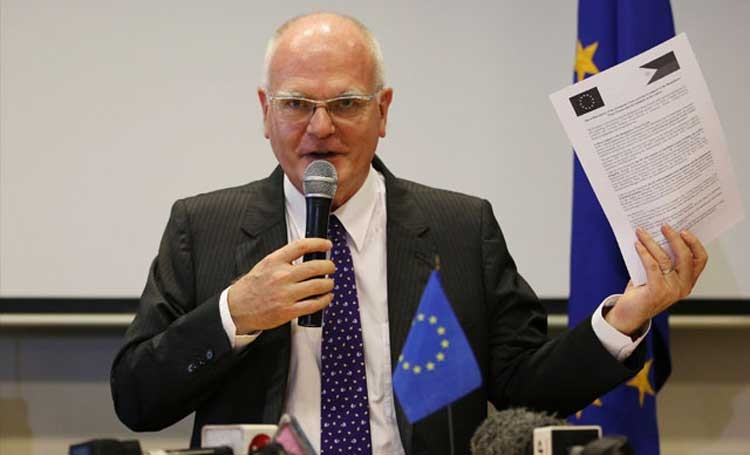
AS far as the European Union (EU) is concerned, the Philippines has yet to come up with a final decision on whether it would reject all kinds of development assistance from the bloc, thus whatever funding it has set aside for the country stays.
“I think there are still some misunderstandings that need to be cleared out of the way before a final decision will be taken,” Franz Jessen, the head of delegation of the EU to the Philippines, told reporters on Thursday on the sidelines of Energy Smart Philippines 2017 at Bonifacio Global City in Taguig City.
Mr. Jessen was reacting to recent pronouncements from Philippine President Rodrigo R. Duterte that his administration would no longer accept any funding from the EU, only for Foreign Secretary Alan Peter S. Cayetano to qualify later than only those with “conditionalities” would be rejected.
Mr. Duterte made his announcement after a group of parliamentarians from EU came over and criticized the administration’s rights record. He stuck to his stand even after the bloc clarified that the visitors were not an official EU delegation.
“I’m optimistic that at the end of the day good sense will prevail,” Mr. Jessen said.
The EU ambassador to the Philippines said his group was “discussing internally” extending €55 million as development assistance to Mindanao “with special focus on Marawi,” referring to the southern city that became a battleground after it was taken over by the Maute terror group in May and declared “liberated” by the President only this week.
“Later on we intend, if things go well, to expand [the assistance] so that the total could be around €100 million for Mindanao and Marawi,” he said.
“We have had development cooperation with the Philippines for 35 years and when you look back, even if you look back in the last 18 months or so, there has been nothing in our development assistance that has prevented the Philippines from having an independent foreign policy,” he said.
“You have an independent foreign policy. You’ve had that for decades, with or without the EU development assistance,” he added.
Mr. Jessen said that what the EU wanted to do in the Philippines is to continue with its development program that had been previously agreed upon “and to do the activities that we have put money aside for.”
“Our development assistance is for the people of the Philippines and that’s where we have to focus,” he said.
He said the program is focused on Mindanao, and the issue of peace and stability, which he said is important not only for residents of the island but also for European investors who are looking to do business in the Philippines.
“European investors don’t look at the country as being divided into different regions, but they look at it as one country and it’s important that there’s peace and stability throughout the country,” he said.
He said a big part of the funding that the EU was looking to set aside for Mindanao is for job creation not only to help in Marawi’s reconstruction but also to give residents in the area hope.
“So job creation would be a major focus, energy would also be a major focus,” he said.
Mr. Jessen said his group had a “very intense” discussion with Mr. Cayetano and Finance Secretary Carlos G. Dominguez III on Tuesday where the two sides went through the different issues.
“When we support, say, Mindanao, we want the money to go to Mindanao. So you can say this is a condition, you can say it has to go to Marawi, but that in my view is very, very normal. We don’t want that money to be spent on something else. We want it to be spent on the purpose that we’ve agreed with the government,” he said.
But he said the EU has an overriding conditionality regarding the question of corruption. He said in any of its development cooperation program, in the Philippines or other parts of the world, it has reserve the right to discontinue funding if a project is not graft-free.
On Thursday, the EU along with the European Chamber of Commerce of the Philippines hosted a delegation of 40 entities from Europe that are looking to forge partnerships and cooperation deals with local entities in projects involving renewable energy.
“This is a very good example on how we use our development cooperation funds to bring businesses from Europe and from the Philippines closer together and to share ideas about green technology and work together to get a better future for the generations to come partly in the Philippines but also in Europe,” Mr. Jessen said.
Victor V. Saulon | Business World
Image Source: Philippine Star